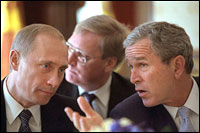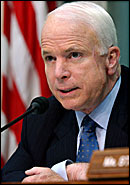Last Thursday, when the Russian cabinet moved to ratify the Kyoto Protocol, international leaders called it the dawn of a new era.

Putin (left) and Bush take opposing views on Kyoto.
Photo: Eric Draper, WhiteHouse.gov
Top officials from Canada, Japan, the European Union, and other Kyoto-supporting countries applauded Russia’s progress toward ratification, which will be final once the nation’s parliament gives it the green light (a mere formality at this point). Then it’s just 90 days more until the treaty’s implementation. “Russian ratification would ensure that the protocol enters into force and launch an exciting new phase in the global campaign to reduce the risks of climate change,” declared Joke Waller-Hunter, the executive secretary of the U.N. Framework Convention on Climate Change.
No such hearty congratulations, though, were heard from George W. Bush, who threw in the towel on Kyoto negotiations in March 2001 despite the fact that the U.S. is proud producer of more than one-third of global greenhouse-gas emissions. In fact, no statements on the matter were released by either the Bush or Kerry campaigns, and only scattered, unenthused coverage could be found in American news outlets.
In one Washington Post article, the chair of the White House Council on Environmental Quality, Jim Connaughton, veritably jeered at the treaty, trotting out the much-contested notion that regulating greenhouse-gas emissions would hamper economic progress: “The administration strongly opposes any treaty or policy that would cause the loss of a single American job,” he said.
The tepid U.S. response to progress on Kyoto might lead Americans to wonder: If the protocol goes into force throughout the vast majority of the industrialized world and the U.S. continues to ignore it, will it have any impact on the United States at all?
Technically and symbolically, the answer is yes — most definitely. The protocol contains legally binding emissions standards requiring 36 industrialized countries to reduce their combined greenhouse-gas emissions by at least 5 percent below their 1990 levels by 2012. Those targets will have widespread ramifications for industrial activities within those countries — even activities conducted by U.S. corporations.
“At least hundreds, maybe thousands of U.S. companies — including the majority of the Fortune 500 — have multinational operations in Kyoto-supporting countries and will have to reshape manufacturing strategies at their overseas plants,” said Phil Clapp, president of National Environmental Trust. Moreover, it would make little sense for corporations to undertake this kind of strategic shift in their facilities abroad but not at home, said Clapp. “It’s more efficient to make it a corporation-wide effort.”

Where there’s smoke …
Clapp also argues that because Kyoto is based on a global cap-and-trade program, companies that get in on it early will have an advantage — they can buy cheap emissions credits before the price starts to get bid up. “My guess is that American executives are going to start clamoring to get in the game before too long.”
They may not be clamoring yet, but there are signs that major U.S. companies are facing up to reality. Last Saturday, The New York Times reported that Ford executives have been working behind the scenes to develop a company-wide strategy for carbon-dioxide reductions. And on Sunday, The Washington Post reported that Alcoa is starting to make plans to adjust to the restrictions that Kyoto will bring in countries around the world.
According to David Sandalow, an environmental scholar at the Brookings Institution who was an assistant secretary of state during the Clinton administration and helped to design the Kyoto treaty, state and regional initiatives designed to combat global warming are also giving U.S. executives reason to welcome the prospect of federal emissions controls.
Recently, California, New York, and other states have been taking matters into their own hands. Late last month, with the support of Gov. Arnold Schwarzenegger (R), the California Air Resources Board approved a landmark standard for greenhouse-gas emissions from all new vehicles sold in the state beginning in 2009. Northeastern states, meanwhile, have been working to adopt a regional cap-and-trade system for carbon emissions.
“There’s a patchwork of overlapping laws emerging at a grassroots level, and it could become very confusing for American companies to have to adapt to different requirements in each state,” said Sandalow. “Corporate leaders may soon be arguing that it’s much easier and more efficient for them to operate according to one clear national standard.”

McCain is plotting to bring back the Climate Stewardship Act.
Head for the Hill
The ripple effect of Kyoto’s implementation won’t just hit the Fortune 500 crowd — it’s likely to resonate on Capitol Hill, too. Word has it that Sens. Joe Lieberman (D-Conn.) and John McCain (R-Ariz.) are aiming to revive their Climate Stewardship Act. It’s unlikely to happen before the election, but they may try to push the bill through in the lame-duck session during the last two months of the year.
“We’ll jump on the first viable or appropriate vehicle that we can take to get the act back on the Senate floor — a bill that we can attach the Climate Stewardship Act to as an amendment,” said Lieberman’s press secretary, Casey Aden-Wansbury. “We’re hoping it will happen before the end of the year, but the Senate calendar, controlled by [Senate Majority Leader Bill] Frist [R-Tenn.], is hard to predict.”
Aden-Wansbury said that Russia’s backing of Kyoto could play a role in the act’s passage: “It couldn’t be better timing — we only need seven more votes. [Russia’s approval] would be a pretty convincing reminder that the U.S. is lagging and we’ve got to move forward.”
According to Jonathan Black, legislative assistant to Sen. Jeff Bingaman (D-N.M) on the Energy and Natural Resources Committee, “The climate debate in Congress hinges on a group of senators, some of them pro-environment, who’ve made it clear they’re interested in taking the carbon issue seriously but are concerned about the cost to the American economy and the fact that developing countries are unregulated,” which could make them cheaper locales for factories.
Among potential Climate Stewardship Act “swing voters” are Sens. Lamar Alexander (R-Tenn.), Max Baucus (D-Mont.), Robert Byrd (D-W.V.), Kent Conrad (D-N.D.), Byron Dorgan (D-N.D.), Mary Landrieu (D-La.), and Arlen Specter (R-Penn.).
“If Kyoto goes into force, it will make a very strong case [to senators concerned about the cost of emissions cuts] that greenhouse-gas regulations are becoming an economic advantage — not a hindrance — in the global market,” said Black. “It will make it harder for them to defend their arguments to the contrary.”
Bingaman, McCain, and Jim Jeffords (I-Vt.) are among a handful of senators who released strong statements spotlighting Bush’s negligence on the issue in the past few days. “The Bush administration continues to fumble around in the darkness of ignorance and the quagmire of special interests, while the Russians are demonstrating world leadership,” Jeffords said in a statement. Said Bingaman on the Senate floor Monday, “Mr. President, the science of climate change is clear, and the potential losses to our economy from climate-related disruptions, such as the increased frequency of hurricanes and other severe storms, are starkly apparent.”
But though Kerry made brief reference to Kyoto and global warming in the first presidential debate last week, he has no plans to release a statement on Russia’s movement toward ratification of Kyoto, said Roger Ballentine, a senior environmental advisor to the Kerry campaign. “At this point it’s clear that Kyoto will not be adopted in the United States, but the U.S. needs to show domestic leadership on this issue,” he said. “Kerry’s energy plan — which includes 20 percent greater efficiency and 20 percent of America’s electricity powered by renewables by 2020 — is the single strongest climate initiative that’s ever been proposed.”
Another senior advisor to the Kerry campaign, Beth Viola, added that Kyoto is by no means the final frontier of international climate-treaty negotiations. The protocol has a limited life span — it defines targets that must be achieved by 2012, but there is no agreement about what to do beyond that. International leaders need to begin devising a Kyoto Part Two — “a new agreement that outlines more long-term caps and brings developing nations like China, India, and Indonesia into the contract,” said Viola. “One of the first things that John Kerry would do as president would be to reengage with the international community on this next phase of negotiations.”
But the U.S. has some real work to do before it will be taken seriously again at the bargaining table. “The most important step now is to put our own house in order, to enact binding emissions cuts domestically,” said Sandalow. “Only then will we have the credibility to lead the international community in phase two of the negotiations.”
Let’s hope the swing senators keep this in mind when the Climate Stewardship Act reappears on the Senate floor.


